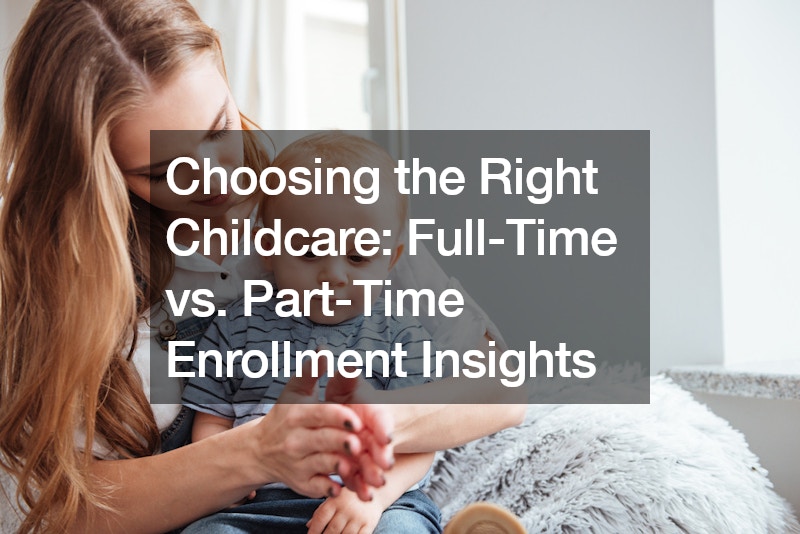Deciding on the right childcare arrangement for your little one can be a daunting task for many parents. A common dilemma arises when considering whether to enroll your child full-time or part-time in a daycare preschool program. To unravel this decision-making puzzle, let’s explore some insights from the perspective of childcare providers with over two decades of experience.
One of the prevalent misconceptions among parents is the belief that enrolling very young children full-time might be overwhelming for them. The instinct to shield toddlers from what seems like an extended period away from home is understandable. However, childcare providers often argue that, counterintuitively, younger children who enroll full-time tend to adjust better to the daycare preschool environment.
Consistency is the key factor here. When infants and toddlers are enrolled full-time, meaning five days a week, they generally experience smoother transitions and adjustments. These children become more adept at handling daycare drop-offs, transitioning between activities, and interacting with different caregivers. Surprisingly, the younger the child enrolls full-time, the more easily they adapt to the daycare preschool routine.
Quality childcare programs play a pivotal role in this equation. Assuming that the program is well-structured, staffed with excellent teachers, and provides a safe and nurturing environment, young children enrolled full-time tend to thrive. They become comfortable, sociable, and quickly familiarize themselves with the routine. On the contrary, children enrolled part-time may face challenges in adapting to the environment, experiencing longer transition periods and finding it harder to socialize.
Teachers, who are at the forefront of this childcare experience, often express a preference for children enrolled full-time. While part-time enrollment might mean fewer children to manage in a day, teachers who prioritize the well-being and seamless integration of children into the daycare preschool environment find full-time enrollment more conducive. Consistency in attendance allows for a smoother flow in the classroom, benefiting both the child and the teacher.
Transition periods, such as moving from one class to another or engaging in outdoor activities, tend to be more challenging for children enrolled part-time. The gaps between their attendance days create hurdles in adapting to the daycare preschool routine. For instance, a program offering only one or two days a week can lead to extended transition times, making the child’s experience less fluid and potentially more stressful.
Parents sometimes opt for part-time enrollment, intending to test the waters before committing to full-time care. However, this approach can backfire if the child is not given sufficient time to adjust. Enrolling a child for just two or three days a week may not provide the consistency needed for a smooth transition. In such cases, the child may seem uncomfortable or unhappy during those initial days, leading parents to mistakenly believe that full-time enrollment would exacerbate the situation.
The adjustment period for children enrolled full-time is typically shorter, averaging about one to two weeks. On the other hand, part-time enrollment can prolong the adaptation process, ranging from three to four weeks or even up to two to three months. The initial discomfort during drop-offs and transitions is a natural part of the adjustment, and maintaining consistency helps in easing this process.
It’s essential to note that exceptions exist, and each child is unique. Some children enrolled full-time may still face challenges, while others in part-time programs may adjust seamlessly. However, the observed patterns over years of working with diverse groups of young children indicate that consistency and routine play vital roles in their emotional and social development.
In conclusion, when faced with the decision of enrolling your child in daycare preschool, it’s crucial to consider the advantages of full-time versus part-time enrollment. While it might seem counterintuitive to some parents, the evidence suggests that young children often fare better when enrolled full-time. The key factors include the quality of the childcare program, the expertise of the teachers, and the consistency in attendance. Ultimately, every family’s situation is unique, and factors such as work schedules, finances, and program availability must also be considered. However, understanding the potential benefits of full-time enrollment can guide parents in making a more informed decision for the well-being and development of their child in the crucial early years.
Additionally, other factors that parents should take into account when deciding on childcare options include:
-
Cost-effectiveness: Full-time enrollment may offer more value for money compared to part-time options, as many daycare preschools offer discounts for full-time enrollment.
-
Socialization Opportunities: Full-time enrollment provides children with more opportunities to interact with peers, develop social skills, and form friendships, which are essential for their overall development.
-
Consistency in Routine: Children thrive on routine and predictability. Full-time enrollment allows children to establish consistent daily routines, which can contribute to their sense of security and well-being.
-
Parental Work Schedule: Parents’ work schedules play a significant role in determining whether full-time or part-time enrollment is feasible. Full-time enrollment may be more suitable for parents with demanding work schedules or those who require full-time childcare support.
-
Quality of Care: When evaluating childcare options, parents should prioritize the quality of care provided. This includes factors such as staff-to-child ratios, safety measures, curriculum offerings, and the overall environment of the daycare preschool.
By considering these additional factors alongside insights into full-time versus part-time enrollment, parents can make a well-informed decision that best meets the needs of their child and family.
.


